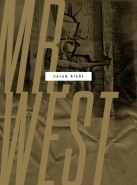
Book Review: Mr. West by Sarah Blake

Mr. West
Poems by Sarah Blake
Wesleyan University Press, March 2015
ISBN-13: 978-0819575173
$24.00; 128pp.
Reviewed by Danny Caine
Sarah Blake’s website describes her debut collection Mr. West as “an unauthorized lyric biography of Kanye West.” Indeed, the book does chronicle the notable moments of Kanye’s life: we see the car crash that inspired his first single, we see his mother’s death, we see him stealing the mic from Taylor Swift, we see his romances with Amber Rose and Kim Kardashian. But Mr. West is no simple rehashing of its subject’s well-trod life story. Rather, Mr. West serves as bible, myth, apology, defense, and memoir. The whole thing memorably swirls around its enigmatic and challenging muse, who in turn acts as God, as son, as lover, as martyr, as monster. The result is engaging and often dazzling.
Mr. West is best when Blake’s story intertwines with Kanye’s. The closer she lets him in, the more wrenching these poems become. In the collection’s first poem “‘Runaway’ Premieres in Los Angeles on October 18, 2010,” Blake makes the connection between her life and Kanye’s clear: “I am two months pregnant/Monday this premiere, Tuesday this article, Wednesday/my first ultrasound.” The poem concludes, “The two of you, tied to this week in my life:” the thought of her unborn child is forever connected to the thought of Kanye West. While every poem here references Kanye, some of the most striking only do so elliptically. In “I Want a House,” Blake’s pregnancy story takes center stage. The word ‘Kanye’ doesn’t appear before the fifth section, but his presence is nonetheless felt. As Blake admits “I could die from this,” (‘this’ meaning pregnancy/motherhood), we know she thinks of Donda, Kanye’s mother, who died before her son. Mr. West’s strongest connection between Kanye and the speaker’s unborn son comes in the chilling “Hybrid,” in which the speaker, the unborn child, and Kanye fuse until
Kanye is half cannon, half ballet.
Half canonical, half prey.
Half my Man of Sorrows.
Half my son.
The poem ends with the stirring couplet “Oh god,/Kanye is half what makes my heart.” Mr. West plumbs the depths of how celebrity and identity can connect.
Blake’s invocation of a god figure at the end of “Hybrid” is one of many instances in which Mr. West deifies Kanye. In “God’s Face,” “Kanye West has a god’s face over gold.” In “Mythic,” Blake inserts Kanye into creation stories, ultimately elevating Kanye’s car-crash career origin to the level of world-building myth:
With a giant axe, Kanye separated the murky Yin and the clear Yang.
Kanye once grew from the ocean and reached the clouds in the sky.
Kanye almost died in a car accident,
and so became a star.
Further, the book closes with a two-part poem in which Kanye and company embody mythical Greek characters from the story of the Trojan war: Kanye is Paris, Kim is Helen, Beyoncé is Hera, and Athena is Nicki Minaj. The poems are called “Kanye Raps “And I’ll Admit I fell in Love with Kim” Pts. 1 & 2.” Throughout Mr. West, Kanye’s actual lyrics hide behind black boxes. An explanatory note for the poem “In Song” states “See lyrics blacked out throughout the book because permission to print could not be gained.” The effect is chilling. We still know what lyrics are being quoted: Blake gives the reader verse/line coordinates for each redacted quote. Thus, the best way to read Mr. West is with a reputable lyrics website at hand. Yet the redactions are no inconvenience. The poetic effect of Kanye’s censored raps is one of the book’s most memorable features. Mr. West has many voices: YouTube commenters, an italicized “fact checker,” a clinical analyst of media, a lyrical confessional narrator. Yet the only voice obscured is Kanye’s. Whatever copyright struggle led to the black bars pays off; after all, one cannot simply listen to the voice of God.
Kanye’s words do appear in Mr. West, but only in the form of Tweets or interview quotes. No poems have any of his lyrics, except one: the devastatingly clever sestina “Twilight: Starring Kanye.” In “Twilight” Blake employs the mechanics of form to subvert whatever copyright issues led her to redact Kanye’s lines. The last words of the first stanza are, in order, “Everybody knows I’m a motherfucking monster:” the chorus from “Monster,” The subversion facilitates the poem’s stunning conclusion, where Blake writes “And everybody/can just freak when ‘everybody knows I’m/a motherfucking monster’ too.” Nowhere in the book is the lyrical redaction more compelling. The words are blacked out but we know exactly what they say. Mr. West’s narrator, like its muse, is a motherfucking monster, too. It is the only time that an utterance by the narrator is redacted, and so it represents a climax: the fusing of the narrator/Kanye hybrid is complete.
By its end, Mr. West has meditated on celebrity mythmaking, obsession, and how the lives of famous people meld with our own. While the concept of an entire book about Kanye may seem cute or too clever, Mr. West is no joke. At its core, Mr. West is a complicated, chilling, and funny exploration of how celebrity and identity hybridize. It has comedic parts (see “Taylor Doesn’t Speak Out Against Racism”), but the book is most memorable when it challenges. The chilling “Dear Kanye,” in which Blake makes a self-consciously strained connection between a fallen branch and Donda stroking Kanye’s hair, ends with the line: “I realize some days I shouldn’t write about you.” Be thankful that those days were the exception.
Danny Caine’s poetry has appeared or is forthcoming in New Ohio Review, Minnesota Review, Atticus Review, and Queen Mob’s Teahouse, among others. His reviews have appeared on Behind the Lines Poetry. Assistant managing editor of Beecher’s, he lives in Lawrence, KS and hails from Cleveland. dannycaine.com

Leave a Reply